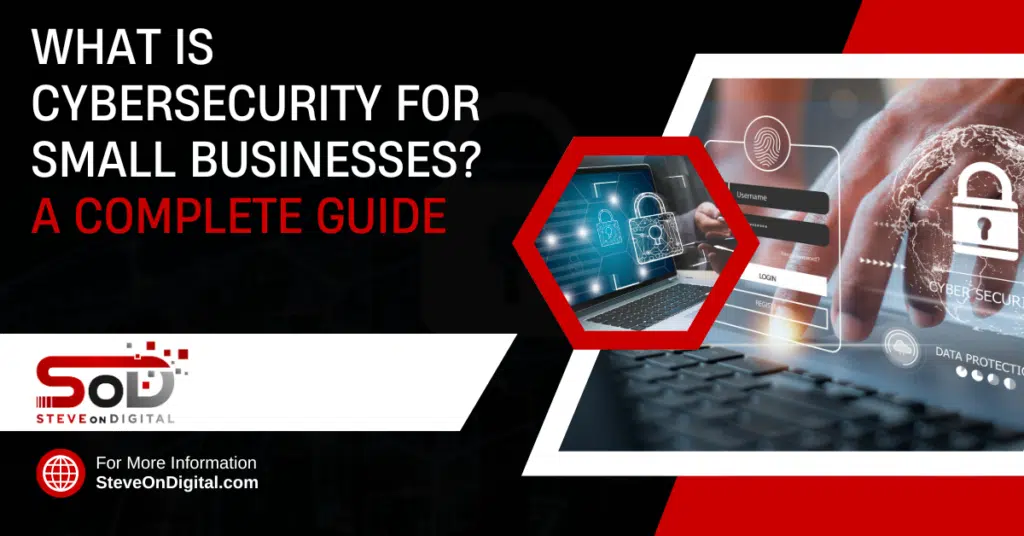What Is Cybersecurity For Small Businesses? – A Complete Guide

As a small business owner myself and the driving force behind SteveOnDigital, I’ve witnessed firsthand the escalating landscape of cyber threats that challenge small enterprises every day. It’s not just the large corporations that are at risk; small and medium businesses are increasingly becoming targets for cybercriminals. My experience has shown me that understanding and implementing effective cybersecurity measures is not just beneficial—it’s essential for the survival and growth of a small business. Cybersecurity for small businesses isn’t merely a precaution; it’s a vital component of business operation in today’s digital world. Recent data reveals that small businesses are the target of 43% of cyber attacks, and yet, only 14% of small businesses are prepared to defend themselves (Source: Cybint Solutions). These statistics highlight a critical gap in cyber defenses that can lead to severe financial and reputational damage. Understanding Cyber Threats To Small Businesses What Are Cyber Threats? Cyber threats, or cyber security risks, encompass any potential malicious attack that seeks to unlawfully access data, disrupt digital operations, or damage information. Small businesses often face threats such as phishing attacks, malware, ransomware, and data breaches. Each of these can be catastrophic, disrupting business operations and compromising sensitive information. Common Cyber Threats: Threat Type Description Typical Impact on Small Businesses Phishing Attacks Fraudulent attempts to obtain sensitive information. Can lead to data breaches and financial loss. Malware Malicious software aimed at damaging or disabling computers. Disrupts operations, risks data integrity. Ransomware Malware that locks data, demanding payment for access. Financial losses and potential loss of critical data. Data Breaches Unauthorized access to company data. Loss of customer trust, potential legal consequences. Impact On Business Operations And Reputation: The effect of cyber attacks on small businesses can be devastating. Financially, the average cost of a cyber attack on a small business is around $200,000—a staggering sum that can jeopardize the future of a business (Source: CNBC). Beyond the financial impact, the reputational damage can be even more challenging to repair. Loss of customer trust and negative media coverage can persist long after the incident is resolved. Establishing Strong Security Policies In the world of small business, having strong security policies is not just a recommendation; it’s a necessity. As the owner of SteveOnDigital, I can’t stress enough how vital these policies are. They serve as the foundation for protecting your business’s digital assets and sensitive information. Clear and robust security policies ensure that everyone in the company understands their role in safeguarding the business. Importance Of Having Clear Security Policies Key Elements Of Effective Security Policies For Small Businesses Training Employees On Cybersecurity Best Practices One of the most significant vulnerabilities in any security system is the human element. That’s why training employees on cybersecurity best practices is so crucial. At SteveOnDigital, I’ve seen the benefits of well-informed employees who can spot and prevent potential threats before they escalate. Role Of Employee Awareness In Preventing Cyber Attacks Types Of Training Programs: From Phishing Awareness To Password Management Implementing Robust Security Measures In my years as a digital transformation specialist and the head of SteveOnDigital, I’ve advised numerous small businesses on the best ways to fortify their cyber defenses. An essential part of this process involves implementing robust security measures. Every small business, regardless of size or industry, needs to defend itself against increasingly sophisticated cyber threats. Overview Of Essential Security Measures Special Focus On Multi-Factor Authentication And Its Benefits Multi-factor authentication (MFA) has become a cornerstone of modern cybersecurity practices, and for good reason. MFA adds an additional layer of security by requiring users to provide two or more verification factors to gain access to a resource such as a system, application, or online service. Protecting Sensitive Data As small businesses increasingly rely on digital tools and online services, protecting sensitive data becomes more critical. This data includes everything from customer information and employee records to financial data and intellectual property. Types Of Sensitive Data Commonly Held By Small Businesses Strategies For Data Encryption And Secure Data Storage Encrypting sensitive data is one of the most effective ways to protect it from unauthorized access. Encryption converts the original data into an encoded version that can only be decoded with a decryption key. Managing User Accounts And Access Controls In my journey as the founder of SteveOnDigital, I’ve seen firsthand how the management of user accounts and access controls can make or break the cybersecurity posture of a small business. It’s crucial to implement stringent controls that ensure only the right people have the right access at the right times. Importance Of Role-Based Access To Sensitive Information Procedures For Creating And Managing User Accounts Securing The Business Network And Internet Connection As a digital transformation specialist, I emphasize to all small business owners the critical importance of securing their network and internet connections. These are often the gateways through which cyber attackers gain access to business-critical information. Steps To Secure A Business Network Importance Of Secure Wi-Fi Networks And How To Protect Them Regular Risk Assessments And Security Audits In the rapidly evolving digital landscape, regular risk assessments and security audits are crucial for maintaining robust cybersecurity, especially for small businesses. Having spent years guiding small and medium businesses through digital transformations, I’ve seen the positive impact that proactive security measures can have on preventing cyber incidents. How To Conduct A Cyber Risk Assessment The Role Of Regular Audits In Maintaining Cybersecurity Developing An Incident Response Plan An effective incident response plan is your business’s playbook for dealing with potential cyber security incidents.As someone who has both developed and activated these plans, I can attest to their value in minimizing damage during an incident. Components Of An Effective Incident Response Plan Component Description Purpose Preparation Tools and procedures for handling an incident. Ensures readiness to respond to cyber incidents. Identification Detection of potential security incidents. Early detection to limit damage. Containment Short and long-term containment strategies. Prevents spread of the incident within the network. Eradication Removal of the security threat. Cleans

